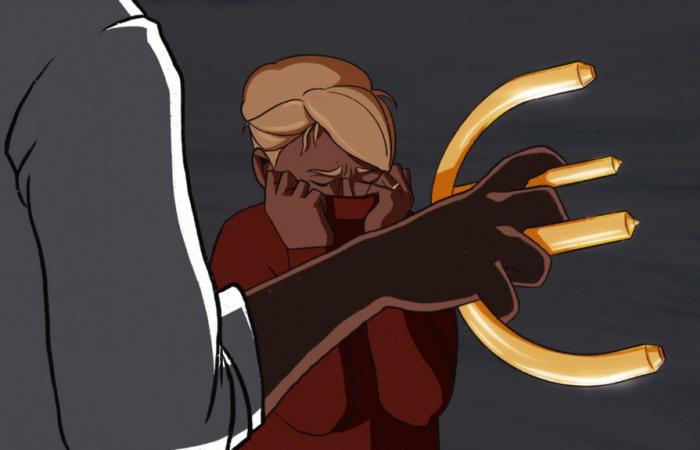Sometimes difficult to identify, economic pressure on a spouse can combine with other forms of violence. Associations are seeing an increasing number of testimonies from women pushed to the point of financial asphyxiation or deprived of resources after a separation.
“When we lived together, he gave me a little money. He earned a good living. He didn't want me to work. Every time we had an argument, he reminded me of it. It was like a bandage to calm down what he was feeling. was doing.” For twelve years, Fatima* says she lived “a climate of violence” with the father of her children. “He threatened me with a knife, for example”says this 36-year-old Tunisian woman, who arrived in France at the age of 20, after this arranged marriage. Among the attacks she says she suffered were physical, sexual and psychological violence, as well as economic violence.
This form of violence is less well known, but 41% of women say they have been confronted with it within a couple, according to an Ifop survey for the feminist media The Glorious in fall 2023**. The vast majority of them (99%) say that they have also suffered at least one other form of domestic violence, “most of the time at the same time”specify the authors of the survey. On the occasion of the International Day for the Elimination of Violence against Women, Monday November 25, and five years after the Grenelle on domestic violence, which had already highlighted economic abuse, franceinfo collected the words of four women concerned and the professionals who support them.
When her husband tries “to strangle him”fin 2021, Fatima, you can “die”. She then turned to the Maison des femmes de Saint-Denis (Seine-Saint-Denis), a reception center for victims of violence, which helped her file a complaint. A few days later, the violence repeated. The police intervened at the family home to separate the couple. Fatima is hospitalized for three days. She returns home in post-traumatic shock. Her husband left. Her twins, then aged 7, are in the care of Child Welfare.
Six months later, Fatima will “much better” and her children come back to live with her. Today, the thirty-year-old, in divorce proceedings, still lives in the same house, in the Paris region. But she will have to move, because her ex-partner no longer repays the mortgage. “He refuses to pay the loan”she says. The same goes for the electricity, suddenly cut off in the home. “I didn’t have access to pay the bill because he wanted to manage everything”explains Fatima.
“A violent spouse who stops paying the rent or credit is common”explains Léa Dercourt, social worker at the Maison des femmes de Saint-Denis for three years, who now works in Paris. “The objective is to scare the woman and make her feel insecure.” She thus observes that “many women do not have their own account”. Last year, she accompanied a 32-year-old woman “to use a bank card for the first time”. “Often, the gentleman takes the car from the lady. But if he has fines, the seizures are made from the lady’s salary”she also illustrates.
“In every situation of domestic violence, the question of economic violence arises, but it is poorly identified by the system and the victims”points out Léa Dercourt.
“The control of money participates in coercive control, which itself participates in the mechanism of control.”
Léa Dercourt, social workerat franceinfo
And for this social worker, this violence continues well after the breakup: “Even if they leave the abusive partner, victims pay the consequences of economic violence for years.” Thus, Léa Dercourt estimates that two thirds of the women she received for this reason were in the process of separating or had just left their partner.
This is the case for Nathalie. In August 2022, the man she married in 2019, after three years of living together, left her to live with another woman. He leaves the day after a nightmarish night for this 55-year-old woman, who says she was the victim of chemical submission and filed a complaint for rape. Nathalie then learns that the overdraft on their two joint accounts has reached “nearly 7 000 euros”. Her husband can no longer repay the loans taken out for work on their house. Nathalie found herself financially asphyxiated, especially since she lost her job during this period.
“All my severance pay has been swallowed up”she whispers. Like Fatima, she finds herself without electricity in her home due to unpaid bills. What to put “life in danger”because she says she needs a device to treat sleep apnea. “When he left, he no longer paid anything. From one day to the next, I found myself with nothing. I experienced the collapse, day after day”she testifies.
Today, Nathalie still receives part of her unemployment benefits, but lives in fear of seeing her house seized. She turned to a family court judge to obtain a contribution to the expenses of the marriage, while awaiting a divorce request. To denounce the “economic and psychological violence”she filed a complaint on March 8, which the public prosecutor's office recorded under the classification of “habitual violence by spouse”. Encouraged by her two children aged 26 and 28, the fifty-year-old managed to found with them an association to help victims, Victime-lience. “It’s not up to me, it’s not up to us, to be ashamed,” believes Nathalie, who also benefits from the support of Jessica Stéphan, another woman committed to fighting economic and domestic violence.
A victim herself several years ago, as she told the EchosJessica Stéphan became a trainer after a twenty-year career in the world of banking. “Bankers have insight. They can talk about financial fairness and how expenses are organized within the couple”she explains.
“Economic violence is the moment when the toxic spouse will weave his web.”
Jessica Stéphan, trainer on domestic violenceat franceinfo
Jessica Stéphan supports around 30 victims per year, from all social backgrounds. She distinguishes two profiles: “There are those who are deprived of means by their husband. And those, on the contrary, on whom the couple's financing depends entirely.” The trainer calls this second category “cash cows”.
Jade*, advised by Jessica Stéphan, corresponds more to this second profile. When she got married, this Parisian therapist had “a very comfortable standard of living”and her husband “less means”. He distanced himself after the birth of their first daughter, in 2017, then the couple reformed. When their second child was born, fifteen months later, Jade felt like she was falling apart. “into a vortex of nightmares.” “He spends nothing on daily life: neither the nanny, nor the groceries. He only buys for himself”relates this 43-year-old woman. At the time, the couple had just acquired a new apartment. “In six years, he has only paid one monthly mortgage payment,” she assures. Ditto for charges and property tax. However, he demands occupation compensation from him.
Jade would like to sell this apartment, which she now associates with the violence experienced during the confinement period in 2020. “I was covered in bruises. Once, he pushed me into the dressing room with a kick. He shot me in the hip. He threatened me in the ear, while our daughters, with whom he was also mistreating, were hanging from my legs. He sequestered us, the police came to free us. describes, in a voice broken by tears, the forty-year-old, who also speaks of an attempted rape. “I called 3919*** lots of times. I filed eight complaints and I asked a judge to protect me.”
In September 2021, a non-conciliation order was issued. But their divorce is still not finalized. In the meantime, Jade believes that her husband is organizing his own insolvency. “For six months, he did not pay alimony, which amounts to around 300 euros per month”she emphasizes. Today, he is forced to do so, after taking steps with the Agency for the Recovery of Unpaid Alimony, which is responsible for directly collecting the amounts owed from the ex-spouse.
Assa*, 36, who arrived in the Paris region in 2012 to finish her studies, is experiencing the same situation. Of Comorian nationality, she cannot apply for Aripa, because her residence permit on French territory has expired, but she has exclusive parental authority over her son. Despite a judgment in 2022, the father does not pay her – or very exceptionally – the alimony of 200 euros that he owes her each month. Assa tried to manage to live without it, helped by her brother or by providing academic support. In vain.
Assa also then turned to the Maison des femmes de Saint-Denis, from where she filed, in April 2023, a complaint, consulted by franceinfo, for “non-payment of alimony”. A mediation is organized in the summer of 2024, which allows the father to see his son for the first time. “He abandoned me when I was pregnant. He recognized the child then repudiated me. It's torture, he doesn't assume his role and demeans me. He's manipulative”testifies Assa, who considers, like Jade, to be dealing with “a narcissistic pervert”.
“We must treat the symptom, otherwise women are always subjected to economic blackmail”underlines Mine Günbay, general director of the National Federation Solidarité Femmes, at the origin of 3919, the helpline for women victims of violence. According to her, “for four to five years, one in four callers have reported economic violence.” She emphasizes the “resounding” of the awareness campaign launched two years ago in the form of a fake advertising spot.
“We must work from an early age on the economic emancipation of women, regardless of family models.”
Mine Günbay, general director of Solidarité Femmesat franceinfo
“Finding independence again is the most important thing”agrees Léa Dercourt. “The esteem of the women concerned is at rock bottom, so it’s a lot of work. But a large majority of them then manage to become independent,” rejoices the social worker, who saw “full of victories”. With Fatima for example. The thirty-year-old continues to “cure”each day, “his scars”. And confides: “At the beginning of the relationship with the father of my children, in my head, I was like a child. I remained good to avoid annoying him. Today, I am looking for training in pastry making. It's my dream, the project of my life.”
* First names have been changed to preserve anonymity.
** These results come from responses to an online questionnaire from 951 women who have already been in a relationship, within a sample of 1,101 women representative of the adult female population living in France, explains Ifop.
*** 3919, a telephone number dedicated to women victims of violence, is available 24 hours a day, seven days a week. It is free and does not appear on telephone bills.






